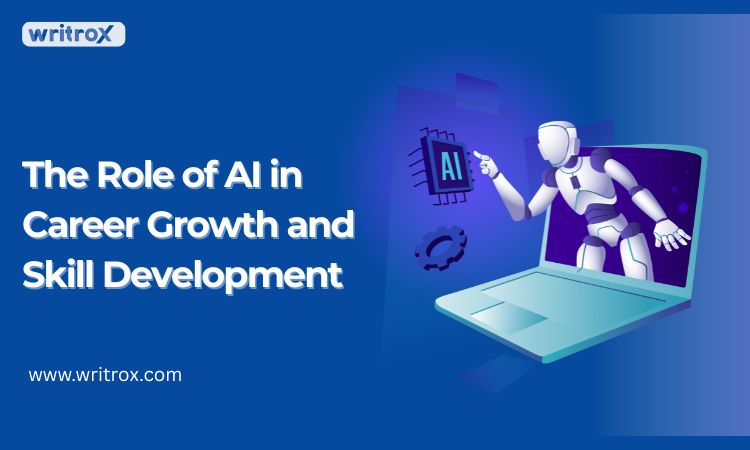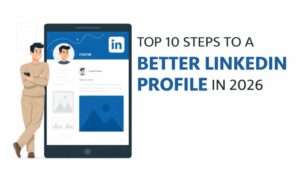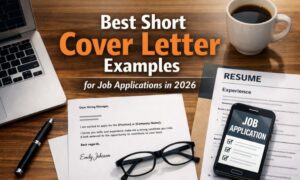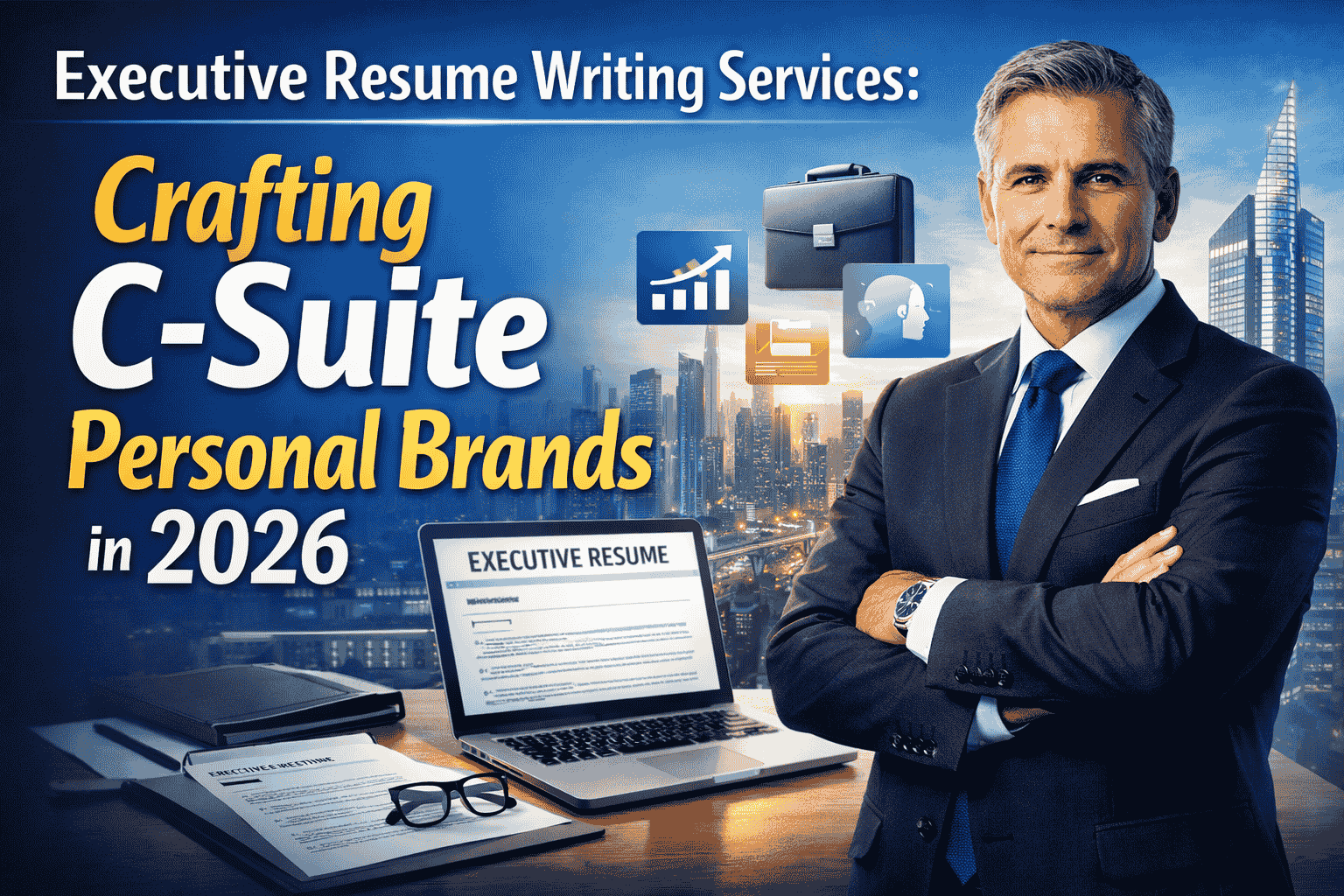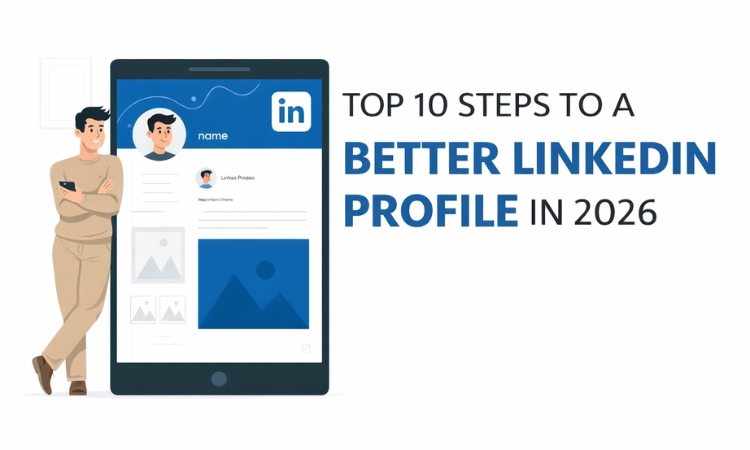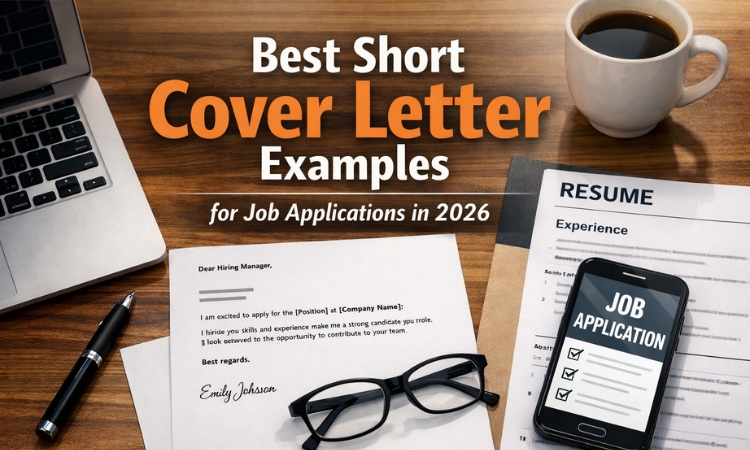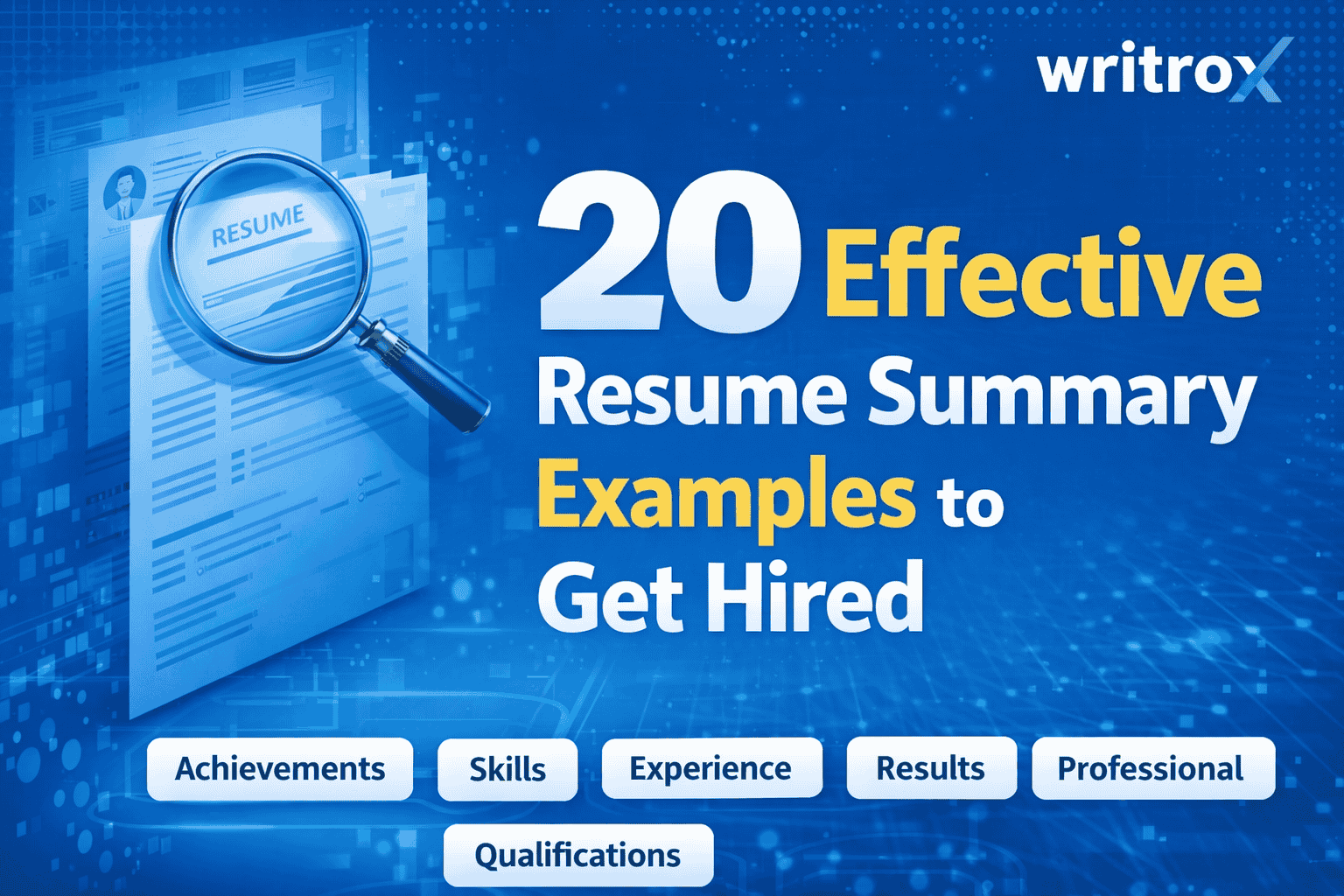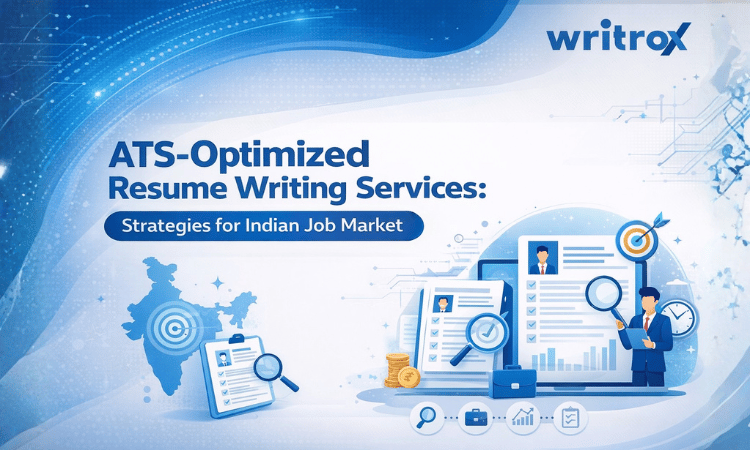Artificial Intelligence (AI) is no longer a technology of the future; it is an incredibly powerful tool that is already shaping the present and future of work. It is quickly changing how we work and learn, thus creating new opportunities for career advancement and skill development.
Workforce needs are evolving quickly and workers must navigate a world where AI does not simply automate tasks, but also can personalize learning and guide you in making decisions. The workspace landscape is evolving quickly to understand and leverage AI to stay competitive.
In this article, we will look at how AI is changing the workplace and interpret its implications on task automation, skill development and Role of AI in Career Growth.
How AI Is Reshaping the Workplace?
Workplaces have always been affected by advances in technology. Not many decades ago, offices relied on paper files, manual ledgers and face-to-face meetings. Computers and digital tools changed all of that – making ways for us to do things more efficiently and accurately, on a medium that is easier to access.
Now with AI, it is time for the next major workplace transformation – building on our digital foundations, and optimizing workplaces for even more efficiency, flexibility, and adaptability.
AI-powered systems are radically changing the way we arrange and carry out tasks. AI systems can take care of repetitive, basic tasks (like simple data entry, or managing the scheduling process enabling you to focus your time and energy in more creative and strategic areas.
AI-powered solutions harness intelligent algorithms to examine and assess massive data sets, looking for trends, signals and insights you would take a considerable amount of time if attempting manually. Not only will this improve decision-making, but it will also enhance your productivity by reducing errors, stress, and wasted time.
You should also be aware of the costs associated with using AI services, natural resources that are exhausted in running servers for the same, and the kind of training models that are being fed to the AI to learn from.
Key benefits of AI in professional development
Here are some key benefits of AI in professional development-
1. Personalized Learning Experiences
AI can help determine what you understand well and then suggest a path forward that is fit for you. You may be learning any subject- from programming to business theory- AI can cover just about everything for you.
AI enables us to access several individual platforms and other pools of knowledge that we might not find on our own. It enables limitless access to knowledge with improved efficiency and accuracy, and helps us stay motivated throughout the learning process.
2. Real-Time Skill Gap Analysis
AI platforms engage with you to assess your skill set. It can also recommend the job that it deems best for you according to your skills and instincts. This provides you the clearest path and makes it easy for you to make decisions. This also saves you a lot of time and hassle.
AI can also analyze gaps in your skill set and suggest improvements. Career planning tools- skills gap analysis performs a real time industry comparison of current trades and compares it with your abilities, and tells you exactly what you might want to work on.
3. Enhanced Productivity and Focus
AI tools allow you to recall your day and your plans for the day. Intelligent systems can help you filter email, manage activities, and remind you to take breaks. They can help you with time management.
By making automatic scheduling of tasks, AI is sparing us time to focus our energy on more productive areas.
Types of AI tools that are shaping career growth
Here are the types of AI tools that are shaping career growth.
1. Career Mapping Platforms
Career mapping platforms help you understand:
- Where you are currently based on your skills and achievements,
- Where you can go next based on your competency and aspirations,
- What skills and qualifications you need to reach your goals.
These platforms often begin with a resume scan, helping you identify suitable career options. Using a professional Resume Writing Service can ensure your resume is optimized to reflect your strengths and align with your ideal career path.
Career Making Platforms use data-driven insights and recommend career paths based on your background, interests, skills and current market opportunities.
Modern tools powered by AI for career growth help professionals make smarter decisions about their future. These platforms study your strengths, work history, and learning patterns to guide you toward the right opportunities. With AI in career development, you can understand which roles fit your profile, which industries are growing, and what skills you must learn next. This ensures your career choices are not random but aligned with real data and future demand.
2. Adaptive Learning Systems
Adaptive Learning Systems help you learn quickly. You may understand it like a teacher who watches how well you understand something and then adjusts the lessons to match your speed and style. If you already know something then it skips the basics and saves time.
They use AI to adapt the difficulty level and the content flow depending on the learner. These systems keep users challenged but not overwhelmed. In career-focused tools, AI can also assist in crafting an ATS-friendly resume that aligns with current hiring trends.
3. Interview Preparation Assistants
Virtual interview assistant judge features like-
- Natural language,
- Speech recognition,
- Body language, and
- Clear vocabulary.
It provides valuable feedback to refine our communication skills. You may then feel more confident during real interviews.
These assistants prepare you for job interviews by asking practice interview questions. It also suggests different ways to talk about your skills and experience more strongly and professionally.
How AI supports Career Transitions and upskilling?
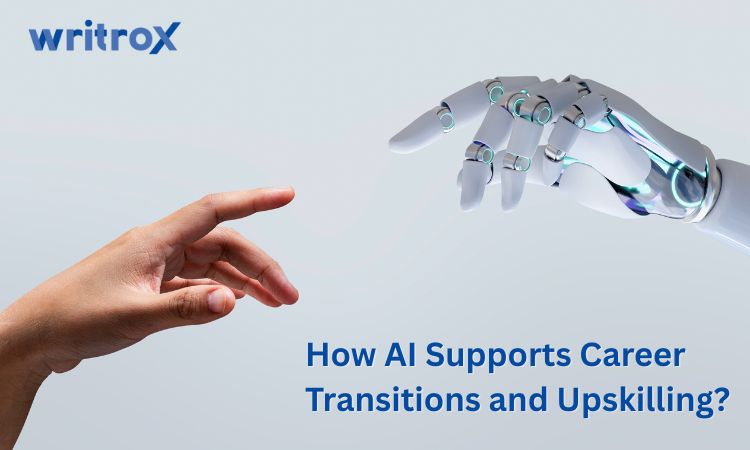
To understand the role, you must understand how AI supports career transitions. Let’s know Upskilling with AI in detail through given points.
1. Identifying Transferable Skills
Switching careers can be challenging. This is where AI makes it easier for you. AI tools can assess your existing skills and work history to identify skills that are transferable across industries.
A project manager in the IT sector, for example, may not realize that their skills in team coordination, budgeting, and communication with stakeholders also transfer to healthcare or finance sectors.
AI-based online platforms like LinkedIn’s Skills Assessment or Eightfold AI identify transferable skills by using your profile to review thousands of job descriptions before recommending positions most suited to your background.
2. Smart Job Matching Engines
Unlike typical job boards, AI job matching technology can do more than simply matching keywords. AI job matching technology can review your skills, career aspirations, experience, and even soft skills to recommend positions that you may not have thought of, but are a solid match for.
For instance, systems like Rezi, or HiredScore, use Machine Learning algorithms to match candidates to jobs.
3. Tailored Certifications and Courses
AI can personalize learning by suggesting certifications, or other learning opportunities that address gaps in your skills and align with your career aspirations.
The recommendations for learning will be based not only on your profile and career goals but also the market needs to make sure you remain relevant in the job market.
Out of thousands of options, AI narrows down the most relevant option based on our experience and our goals. So, we can say that AI Careers help you to grow fast.
Challenges and Considerations in AI-Driven Career Development
Here are the challenges and considerations in AI-driven career development-
1. Risk of Algorithmic Bias
While smart work makes work easier it can also make mistakes sometimes. AI learns from past instructions and resumes and may form unfair biases based on the given data. It could favor one gender, race, or age group over another. So you must make sure to check the data model you are training an algorithm with, followed by its output.
AI can also be biased toward someone because of some errors in the system. These biases can have some serious consequences depending on where and how the algorithm is used.
2. Data Privacy and Transparency
Data privacy is important. Many job platforms often ask for personal information like your name, age, contact, work history, skills, goals among others. This raises serious concerns about how securely this data is stored and who has access to it.
Users often lack clarity on how their information is used to make career recommendations or decisions. Therefore you should ensure transparency with your users regarding the decision-making process of AI and obtaining informed consent to build trust and accountability.
Conclusion
The age of AI revolution is here already. By performing routine tasks, personalizing learning, or supporting more informed decision-making, AI Training allows you to expand your career and build skills for the future.
By incorporating AI-enabled changes into your practice, you will be better positioned to adapt and to innovate in a world of work that is rapidly evolving. Now truly is the time to harness the power of AI for your professional development.



